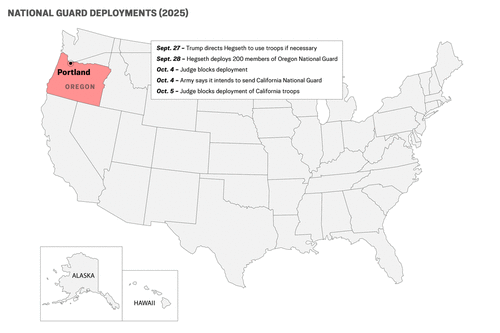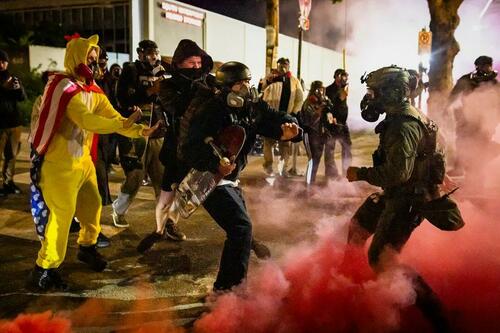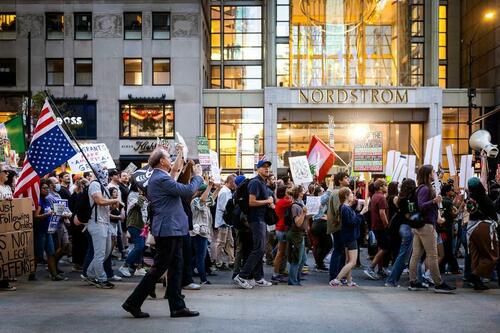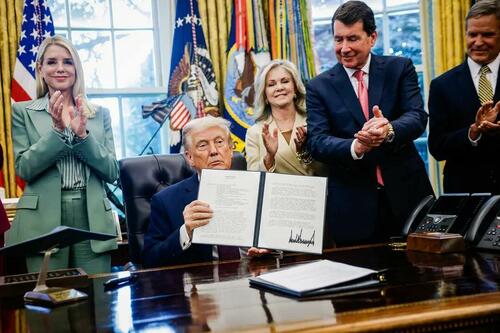Legal Battles Rage Over National Guard Deployments To 5 States – What To Know
Authored by Sam Dorman via The Epoch Times (emphasis ours),
President Donald Trump has announced his intent to send National Guard troops to major cities across the United States in an effort to combat criminal activity.

In response, some government officials have alleged that he’s exceeding his legal authority by disregarding certain limits Congress placed on his ability to federalize the National Guard.
The resulting controversy has raised questions about the balance of power between state and federal governments.
Trump has already encountered legal battles over his attempts to federalize state National Guard troops, in part due to a law known as 10 U.S.C. § 12406. In that law, Congress set limits on presidents’ ability to federalize the National Guard—specifically requiring either an invasion, rebellion or danger of rebellion, or an inability by the president to execute the law with regular forces.
This law has already come up in lawsuits from California, Oregon, and Illinois and could resurface depending on how state and local governments respond to future deployments.
Here are some of the key things to know about the battle over National Guard deployments to Portland, Ore., Chicago, Memphis, Los Angeles, and Washington, D.C.
Portland
War Secretary Pete Hegseth called 200 members of the Oregon National Guard into service but a judge quickly ruled against it.
According to the Trump administration, federal immigration enforcement within Portland has been targeted with violence in recent weeks. White House press secretary Karoline Leavitt said during an Oct. 6 briefing that an Immigration and Customs Enforcement facility had been “under siege.”
“We saw again a guillotine rolled out in front of this federal building,” she said. “And so the President wants to ensure that our federal buildings and our assets are protected, and that’s exactly what he’s trying to do.”
Agitators in Portland could be heard yelling explicit comments and death threats towards federal agents. “The guillotine would be ready for them,” one wearing black-bloc clothing shouted. Some yelled “ICE out of Portland,” while a crowd of pro-ICE supporters were also seen over the weekend—with one holding a sign that read “God Bless ICE.”
The state of Oregon and city of Portland acknowledged activity outside of the ICE facility but denied that it was the kind of protest that justified federal intervention.
U.S. District Judge Karin Immergut agreed when she issued a temporary restraining order on Oct. 4. She recounted incidents such as individuals shining flashlights on drivers and setting up a makeshift guillotine. While these incidents were “inexcusable,” she said, “they are nowhere near the type of incidents that cannot be handled by regular law enforcement forces.”
The administration also violated the 10th Amendment, she said, by unlawfully attempting to federalize the troops. “Because the President is federalizing the Oregon National Guard absent constitutional authority, his actions undermine the sovereign interest of Oregon as protected by the Tenth Amendment,” she said.
The case became more complicated when the administration attempted to deploy members of the California National Guard to Portland—something California Gov. Gavin Newsom called a “breathtaking abuse of power.” That too was blocked by Immergut in a subsequent order on Oct. 5.

Chicago
Trump and Republicans have long held up Chicago as an example of a crime-ridden city in the United States. Trump criticized Illinois Gov. J.B. Pritzker on social media in August for not controlling crime in his state.
“He better straighten it out, FAST, or we’re coming!” Trump wrote at the time.
By Oct. 4, Hegseth had invoked Section 12406 to federalize 300 members of the Illinois National Guard. As in Portland, Hegseth also tried to federalize troops from another state—this time Texas—and bring them to Illinois.
On Oct. 5, two people were charged over their alleged attempt to use their vehicles to strike another from Customs and Border Protection. That followed a lawsuit the administration filed but lost over Illinois’ and Chicago’s sanctuary policies.
Chicago Mayor Brandon Johnson has accused ICE of trying to violate residents’ constitutional rights and signed an order to establish what he called an “ICE free zone” in the city.
Like their counterparts in Oregon, Illinois’ and Chicago’s governments quickly responded to Trump’s recent actions with a lawsuit alleging that the president exceeded his authority under the law.
A judge has yet to rule on the state’s request for a temporary restraining order but the eventual decision will likely touch on similar legal issues as Immergut did. As those cases build, along with the one challenging Trump’s deployment in California, they could prompt involvement from higher courts to decide major legal questions surrounding the president’s authority.
Illinois’ lawsuit argued that Trump can’t use federal troops for civilian law enforcement because of a law known as the Posse Comitatus Act, which prohibits such use. However, the Trump administration argued that it doesn’t prevent the president from using troops to protect federal assets, such as an ICE facility.

While protests have occurred at an ICE facility near Chicago, the lawsuit said the protests would be a “flimsy pretext” for sending in troops. “ICE continues to operate the facility to process the hundreds of individuals it has detained in recent weeks,” it said.
White House spokeswoman Abigail Jackson has defended the president’s actions.
In a statement provided to The Epoch Times, Jackson accused Pritzker of inaction. “President Trump will not turn a blind eye to the lawlessness plaguing American cities,” she said.
Memphis
Trump has initiated a multi-pronged approach to tackling crime in Memphis, where violent crime was six times higher than the national average in 2024. For that year, the city ranked first in the nation for per capita violent crime as well as property crime.
Part of Trump’s approach involves sending the National Guard, but it’s unclear if they have started operations in the city.
Trump appeared to have the support of Tennessee Gov. Bill Lee, who joined the president in the Oval Office last month when Trump signed an order establishing the “Memphis Safe Task Force.”
“We’ve made significant investments to address crime throughout my seven years in office, and thanks to President Trump’s leadership, the Memphis Safe Task Force will ensure we have every resource at our disposal to create significant change,” Lee said.

Washington
National Guard troops remain in the nation’s capital nearly two months after Trump initially deployed them over concerns about crime. Leavitt said on Oct. 6 that troops remain in Washington because both the mayor and Trump recognize their presence helps keeps the city safe.
The commanding general, Brig. Gen. Leland D. Blanchard II, said the National Guard will extend its encampment through Nov. 30. The nation, Blanchard said, deserved an effort to keep people safe on the streets of the city.
Read the rest here…
Tyler Durden
Tue, 10/07/2025 – 10:00ZeroHedge NewsRead More




 R1
R1
 T1
T1


